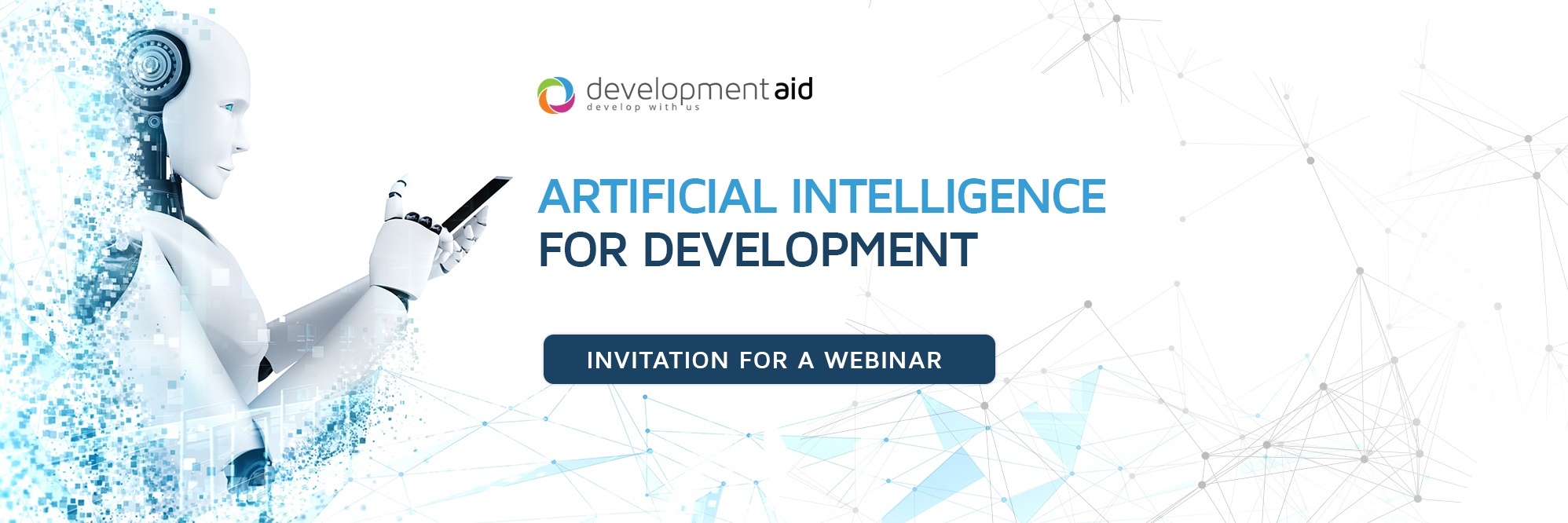Artificial intelligence (AI) is becoming a prevalent topic on the international policy-making agenda. The World Bank, the International Monetary Fund, and other donors are recognizing the remarkable potential of AI to solve the most serious socio-economic challenges at the global level. Moreover, AI can offer a major opportunity for the least developed and developing countries to accelerate progress, improve efficiency and become more competitive both regionally and internationally. However, AI is also associated with several risks in relation to privacy, social marginalization, and discrimination.
Taking into consideration the novel and complex nature of AI, DevelopmentAid has decided to host a webinar in which the leading experts from the field will share their views on the usefulness and the risks associated with AI in international development.
What is AI?
There is no commonly agreed definition of AI due to its complex nature, as it is seen more as a field rather than an easy-definable concept. Nonetheless, Artificial Intelligence can be viewed as the science of making machines and programs intelligent, able to scan their environment, learn from this and take autonomous decisions in response to the feedback they sense. AI has the potential to imitate the human brain thus it can develop the ability to solve complex problems that normally require human intelligence.
AI in International Development
AI’s ability to perform complex analyses by using intuitive algorithms may offer a number of opportunities for the international community to solve the world’s most serious problems. The highly disruptive nature of AI can drastically diminish the cost and enhance the efficiency of the efforts directed to end poverty and improve the wellbeing of all. The latest AI solutions range from apps that predict the success of farmers’ crops in rural Africa to tools capable of remote medical diagnosis in Nigeria. Several international organizations, such as the United Nations) and the World Bank is undertaking ongoing work and have developed a set of approaches and observations that aim to govern activities related to AI development and implementation. A large share of the attention from international organizations is towards managing any of the risks associated with AI and assisting countries to develop relevant national AI strategies and implementation plans.
Associated Risks
Aside from its benefits, AI technology is also associated with a number of risks that may cause significant harm to certain groups of people. Lack of data or faulty algorithmic decisions may unfairly target or exclude people thus leading to discrimination or social exclusion. These are some of the risks associated with AI:
- Fairness and inclusion: AI tools built around biased data or operational frameworks can lead to negative feedback loops, disproportionate impact, and discriminatory outcomes
- Privacy concerns: AI technology may be used for surveillance purposes thereby breaching personal data and privacy laws
- Accountability concerns: AI is expected to deliver significant impacts on human communities but if those impacts become negative it may be difficult to identify who is ultimately accountable for this
Invitation to a Webinar
DevelopmentAid is inviting experts and consultants to attend an exciting webinar on “The role of AI in solving current development challenges: opportunities and risks” that will take place on 2 September 2021 at 3 pm (Brussels Time)/ 9 am (Washington DC Time).
Our Speakers
 Zaki Khoury, Senior Digital Development Specialist at the World Bank
Zaki Khoury, Senior Digital Development Specialist at the World Bank
 Katya Klinova, Head of AI, Labor, and the Economy Programs at the Partnership on AI
Katya Klinova, Head of AI, Labor, and the Economy Programs at the Partnership on AI
Host
 Ion Ilasco, External Relations & Events at DevelopmentAid
Ion Ilasco, External Relations & Events at DevelopmentAid
During the webinar, it will be possible to learn more about AI, its role in international development, and the associated risks and opportunities. Furthermore, due to the interactive nature of our online event, it will be possible to address specific questions to our speakers and build a constructive discussion.
Zaki Khoury is a Senior Digital Development Specialist at the World Bank. His focus is on helping governments to advance their data-driven digital economy, providing thought leadership on enabling policies for digital infrastructure of the future (AI, 5G, Cloud), strengthening digital government platforms, and supporting investment operations in the East Asia, Middle East, and Africa regions. He is an active leading contributor to the work on AI for Development and Data Governance knowledge initiatives. Dr. Khoury holds a PhD in Planning (UdeM), an MSc in Economics (UCL), and a BSc in Engineering (AU). He has also continued his executive education in Business (Harvard) and Management (McGill).
Katya Klinova is the Head of AI, Labor, and the Economy Programs at the Partnership on AI, where her work focuses on designing mechanisms for steering AI progress towards expansion of access to good jobs and improving working conditions along the AI supply chain. Prior to that, Katya’s worked at the UN Executive Office of the Secretary-General on preparing the launch of the Secretary General’s Strategy for New Technology, and at Google in a variety of managerial roles, where she was responsible for launching and driving worldwide adoption of Google’s early AI-enabled services. Katya holds an MPA in International Development from Harvard University, a B.Sc. cum laude in Applied Mathematics and Computer Science from Rostov State University, and a Joint M.Sc. in Networks and Data Science from University of Reading, Aristotle University of Thessaloniki, and Universidad Carlos III de Madrid, where she was a Mundus Scholar.


